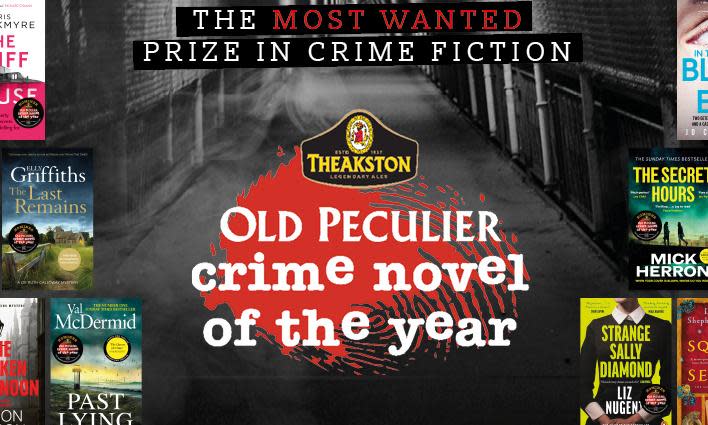‘It really isn’t good enough’: crime novel of the year award criticised for entirely white longlist

The Theakston Old Peculier crime novel of the year has faced criticism after its 2024 longlist did not feature a single book by an author of colour.
The UK and Ireland’s most prestigious prize for crime fiction is awarded to the best crime novel published each year in paperback. The winner is voted for jointly by the awards’ academy and the public, and is presented each year at the Theakston Old Peculier crime writing festival in Harrogate. The longlist is selected by the academy from all the titles submitted by publishers. This year’s longlist comprised 18 books, none of which is by an author of colour.
“It’s very pale …,” thriller writer Sarah Pinborough commented on Facebook after the list was announced last Thursday, sparking a debate among a number of authors.
“A big question is, how does the festival go from having a Black Woman as its Programme Chair in 2011 – me! – to where it is now?” commented crime writer Dreda Say Mitchell. “Who’s on the committee? How did they get chosen? What is the duration of time for someone to be on the committee? This should all be underpinned in clear and transparent policies and documentation … Because currently it really isn’t good enough.”
Barrister and crime novelist Harriet Tyce wrote to the prize’s organisers to express her concerns. “I felt it was important to say that this is not right,” she told the Guardian. “Given that the festival had to issue an apology in 2021 for failing somehow to invite any female author of colour to participate on any panel, one might have thought they would have been more mindful. There’s just no excuse for it.”
A spokesperson from the festival said the organisers “actively seek to provide a platform for writers from all communities and encourage publishers to consider diversity in all our interactions, from submitting authors for the festival programme, to entering them for the awards. Submissions for the awards are open to every publisher with no fee at point of entry.”
However, of the books submitted for the awards this year, just 7% were by known authors of colour, the spokesperson said. “This year’s longlist is unusual – the longlist for the awards over the last six years have all featured writers of colour – but not something we take lightly. We will continue to work with our partners in the publishing industry to ensure we improve representation and welcome interest from crime lovers from under-represented communities to join our Awards Academy.”
The academy is made up of 38 people, two of whom are known to be people of colour. Applications to join the academy were opened this year with the aim of widening its membership.
The spokesperson also pointed out that the festival has improved the diversity of its lineup in recent years. “In 2023, 16% of our headliners and panel speakers were known authors of colour, and in 2024, 18% of our headliners and panel speakers are known authors of colour.”
In 2023, Vaseem Khan became the first person of colour elected chair of the Crime Writers’ Association. He sits on the committee that organises the Theakston Old Peculier festival, and last year he was the festival’s programming chair. “I have seen, first-hand, the efforts the committee has made to bring more writers from minority communities on to the programme,” he told the Guardian. “While these efforts have seen more writers of colour being programmed in recent years, we haven’t yet seen as many submitted for the awards. This is something the committee is acutely aware of and is actively working with the industry to find solutions to.
“I hope that by being a visible chair of colour I am encouraging writers from minority communities to enter the genre and to persist if they are already here,” he added. “The percentage of the UK population that is non-white is around 18%, so ideally we would like at least that many making up publisher crime lists, being invited to festivals, competing for prizes. But for that we need more gatekeepers who understand minority communities – more agents of colour, and commissioning editors.”
Abir Mukherjee is the author of the Wyndham & Banerjee series of crime novels and a guest of honour at this year’s festival. In 2021, he and fellow British-Asian crime writer AA Dhand put out a statement criticising the lack of any female writers of colour on the lineup of that year’s festival. The festival later apologised. However, with regard to this year’s longlist, Mukherjee says that while he finds it “frustrating” not to see authors of colour on the list, he sees it as “the result of issues within the industry rather than the judging process. Given that relatively few non-white authors are published, we need to accept that there will be years without representation.”
“If I’m on a shortlist or a longlist, I’ll always end up thinking, am I there on merit?” he added. “Or am I there because somebody ticked the box?”
Mukherjee suggested that as well as a lack of diversity among the authors being published and gaining recognition, there are also issues at the level of the readership. “When I turn up at any festival, there are very, very few non-white readers”, he said. “Why is it that British-Asian kids are the greatest proportional users of libraries as kids, but then something happens, and British-Asian adults are less likely to visit a library or a bookshop than any other group?”
The winner of the Theakston Old Peculier crime novel of the year will be announced at the 2024 festival, which will be held from 18 to 21 July. The lineup for this year’s festival will be announced on 14 May.


